|
|
|
Sort Order |
|
|
|
Items / Page
|
|
|
|
|
|
|
| Srl | Item |
| 1 |
ID:
153611
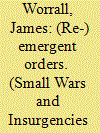

|
|
|
|
|
| Summary/Abstract |
The concept of order is often neglected in the study of conflict – seemingly such a ‘disordering’ process. With the recent increase in the examination of rebel governance however, bringing order back into our understanding of rebel and insurgent groups has much to offer in exploring the everyday politics which connect authorities, rebel movements and the population itself, in a complex mass of intersubjective and power-based interactions and negotiations. Rebels both shape and are shaped by existing forms of order in complex and ongoing ways. This article explores how varying elements interact in the negotiation, framing and enforcement of order and develops an original analytical framework to examine the perpetual negotiations of rebel movements in their attempts to cement their control.
|
|
|
|
|
|
|
|
|
|
|
|
|
|
|
|
| 2 |
ID:
189357
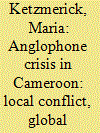

|
|
|
|
|
| Summary/Abstract |
After years of peaceful demonstrations, the Cameroonian Anglophone conflict escalated in 2017. Since the outbreak, over 3,000 people have died and a further thousand Anglophones fled from clashes between state forces and separatist fighters. While activists in the diaspora bid for international support, organizational belonging on the ground changes quickly. The paper investigates the transnationalization of the conflict by looking at the complex set of actors involved. Overall, it is interested in the political sociology of transnational rebel governance. The paper highlights the effects of transnational conflict dynamics on the unity and fragmentation of the self-determination movement and its relation to violence.
|
|
|
|
|
|
|
|
|
|
|
|
|
|
|
|
| 3 |
ID:
180200
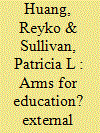

|
|
|
|
|
| Summary/Abstract |
How does foreign support for rebel groups affect rebel governance of civilians during armed conflict? Existing studies primarily examine the local and domestic politics of rebel rule, leaving the effects of foreign intervention on rebel governance underexplored. Focusing on rebel provision of social services, this study considers two competing arguments. The first suggests that foreign sponsorship reduces rebels’ need to rely on local civilians for resources and hence decreases rebels’ incentives to provide services. The second anticipates that by augmenting rebels’ resources and military capabilities, foreign support increases their capacity to provide welfare services. These competing logics suggest that different types of foreign support have divergent effects on rebel social service provision. The article tests this theory using cross-sectional time-series data on external support for rebel groups and rebel governance for the post-1945 period. It finds that rebel groups that receive external funding, weapons or training are significantly more likely to provide education and health services to civilians. In contrast, direct military intervention to assist insurgent forces has no effect on rebel service provision. This article is among the first to systematically study the impact of external support and third-party intervention on rebel social service provision during civil war and holds implications for civilian welfare in contested territories.
|
|
|
|
|
|
|
|
|
|
|
|
|
|
|
|
| 4 |
ID:
189356
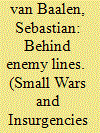

|
|
|
|
|
| Summary/Abstract |
This article examines the conditions that foster state-insurgent cooperation in rebel governance. State-insurgent cooperation is puzzling because it can alienate hardliners, undermine the parties’ legitimacy, reveal sensitive information, and cause autonomy losses. We propose that conflict parties are more likely to discount these costs when they have overlapping civilian constituencies with high governance provision expectations. Analysing rebel governance in Côte d’Ivoire and Sri Lanka using original data, we find that civilian expectations prompt cooperation even when the parties appeal to separate constituencies. The article nuances existing theories of rebel governance and contributes new knowledge on state-insurgent interactions in civil war.
|
|
|
|
|
|
|
|
|
|
|
|
|
|
|
|
| 5 |
ID:
189965
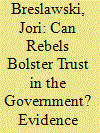

|
|
|
|
|
| Summary/Abstract |
Commitment problems make civil wars difficult to end. Research on overcoming commitment problems focuses on warring parties, however civilians’ perceptions are central to successful transitions from war to peace. While civilians residing in areas previously controlled by armed groups may be highly distrustful that governments will implement peace agreements, I argue that some armed groups are both motivated and capable of improving trust in the state. Using survey data from civilians in the Bangsamoro, Philippines, I show that civilians that experienced rebel security provision or rebel justice provision from the MILF are more likely to trust that the Government of the Philippines will fully implement the peace agreement than civilians that did not experience rebel governance provision.
|
|
|
|
|
|
|
|
|
|
|
|
|
|
|
|
| 6 |
ID:
178376
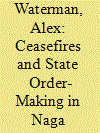

|
|
|
|
|
| Summary/Abstract |
The 1997 Indo–Naga ceasefire is one of the world’s longest truces. Although formally-agreed rules technically regulate the state-rebel relationship, the rules themselves and their applicability beyond the Indian state of Nagaland are ambiguous and open to interpretation. Far from static, the ceasefire represents an evolving cluster of ‘armed orders’ oscillating between coexistence and limited conflict [Staniland, Paul. “Armed Politics and the Study of Intrastate Conflict,” Journal of Peace Research 54, no. 4 (July 1, 2017): 459–67. doi:10.1177/0022343317698848]. Indian state actors display intriguing variations in their approaches towards these orders, from restraint and de-escalation in some circumstances to aggressive local counterinsurgency in others. To date, however, existing research on order within ceasefires focus on rebel perspectives. Building on existing efforts to reconceptualise ceasefires as arenas in which political order is negotiated and constructed, this article re-introduces the state’s role in order-making, locating these processes within wider rebel and non-state attempts to do so. Analysing armed orders in the Naga ceasefire, it reveals a fascinating spectrum of bargaining, signalling and negotiation over the formal and informal rules of armed orders. This challenges the notion that ceasefires simply lock in state-armed group orders, but instead create new spaces for armed order’s renegotiation.
|
|
|
|
|
|
|
|
|
|
|
|
|
|
|
|
| 7 |
ID:
153613
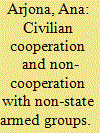

|
|
|
|
|
| Summary/Abstract |
Terms like ‘support’ and ‘collaboration’ are often used interchangeably to denote a loose set of acts or attitudes that benefit non-state armed groups (NSAGs). However, these terms are seldom defined, and the alternatives available to civilians are rarely identified. Moreover, existing approaches overlook that the interaction between civilians and NSAGs is often one between ruler and ruled, which makes obedience and resistance central. This paper proposes to conceptualize the choices available to civilians as forms of cooperation and non-cooperation, offers a typology, and discusses the implications for theory building on civilian and NSAG behavior, and on the functioning of armed social orders.
|
|
|
|
|
|
|
|
|
|
|
|
|
|
|
|
| 8 |
ID:
180199
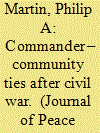

|
|
|
|
|
| Summary/Abstract |
Ex-rebel military commanders play a central role in peacebuilding after civil war. Yet the influence and mobilization power of these actors is not uniform: in some areas commanders retain strong ties to civilian populations after war’s end, while in other areas such ties wither away. This article analyses a novel dataset of former rebel-occupied localities in Côte d’Ivoire to investigate why commander–community linkages endure or decline after post-conflict transitions. The findings support a theory of political accountability: commanders retained political capital and access to networks of supporters in areas where insurgents provided essential goods to civilians during war. By contrast, where insurgents’ wartime rule involved abuse and coercion, commanders were less likely to sustain strong ties. These findings challenge the conventional wisdom that violent warlordism explains the persistence of rebel commanders’ power in peacetime. Rather, effective wartime governance may create regionally embedded strongmen who can in turn disrupt postwar state-building.
|
|
|
|
|
|
|
|
|
|
|
|
|
|
|
|
| 9 |
ID:
159366
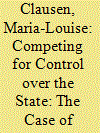

|
|
|
|
|
| Summary/Abstract |
This article argues that the current conflict in Yemen is better understood as a competition over who controls the state, rather than as a conflict between the state and a non-state actor. It traces the development of the Houthis and shows how the movement managed to seize key government institutions. However, the Houthis lack internal legitimacy and have not been able to position themselves as a nationally relevant political elite. The fragmentation of the Yemeni state has resulted in a shift to more localized struggles over access to resources and power that involve both internal and external actors.
|
|
|
|
|
|
|
|
|
|
|
|
|
|
|
|
| 10 |
ID:
177012


|
|
|
|
|
| Summary/Abstract |
When rebel groups with state-building ambitions capture territory, who stays and why? Through semi-structured interviews and an original household survey in the Iraqi city of Mosul, which was controlled by the Islamic State for more than three years, I conduct a multi-method descriptive comparison of the characteristics of “stayers” against “leavers.” I test and find some quantitative and qualitative support for a theory of competitive governance: Civilians who perceived improvements in the quality of governance under IS rule—relative to the Iraqi state—were more likely to stay under IS rule than those who perceived no change or a deterioration, but displacement decisions are multi-causal, influenced by many factors including economic resources, social networks and family structures, information, threat perceptions, and ideology. These findings suggest that historical experiences with weak rule of law and bad governance by states may affect the attitudes and actions of civilians living under rebel governance.
|
|
|
|
|
|
|
|
|
|
|
|
|
|
|
|
| 11 |
ID:
184994
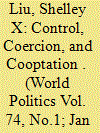

|
|
|
|
|
| Summary/Abstract |
This article examines how rebels govern after winning a civil war. During war, both sides—rebels and their rivals—form ties with civilians to facilitate governance and to establish control. To consolidate power after war, the new rebel government engages in control through its ties in its wartime strongholds, through coercion in rival strongholds where rivals retain ties, and through cooptation by deploying loyal bureaucrats to oversee development in unsecured terrain where its ties are weak. These strategies help to explain subnational differences in postwar development. The author analyzes Zimbabwe's Liberation War (1972–1979) and its postwar politics (1980–1987) using a difference-in-differences identification strategy that leverages large-scale education reforms. Quantitative results show that development increased most quickly in unsecured terrain and least quickly in rival strongholds. Qualitative evidence from archival and interview data confirms the theorized logic. The findings deepen understanding of transitions from conflict to peace and offer important insights about how wartime experiences affect postwar politics.
|
|
|
|
|
|
|
|
|
|
|
|
|
|
|
|
| 12 |
ID:
189350
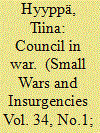

|
|
|
|
|
| Summary/Abstract |
governance have been neglected. This article explores the local council established in the rebel-held city of Daraya, Syria. It informs the fields of rebel governance and civil resistance, specifically wartime order, during civil wars and proposes that the forms and practices of local governance in Daraya exhibited a type of governance best labelled as ‘civilocracy’. In contrast to councils in other opposition-held parts of Syria, the council was established and led by civilians who welcomed rebels to work with them. Based on findings from in-depth, semi-structured interviews with former council members, the article finds that four factors were crucial for this form of governance to emerge and to endure. Key wartime events – a massacre and a siege –, earlier experiences of nonviolent activists, local ties, and the creation of a military office created a space for the maintenance of civil-led order. Daraya offers a fascinating example of how community’s norms affected how rebel governance was created and maintained. This research introduces a new concept to explain wartime order and encourages researchers to find causal explanations for the emergence of this particular governance form in other conflicts.
|
|
|
|
|
|
|
|
|
|
|
|
|
|
|
|
| 13 |
ID:
188328
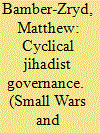

|
|
|
|
|
| Summary/Abstract |
The rise and decline of the Islamic State’s (IS) caliphate between 2014 and 2018 have garnered significant policy and academic attention. Explanations for the group’s territorial demise have focussed on its internal group dynamics and external conflict processes. Although both explanations are valid, I adopt a historical approach to show that IS’s caliphate was just one cycle in a two-decade history of governance activity. IS has undertaken three governance cycles composed of phases of insurgency, gaining territory, establishing institutions, and losing territory. After each governance cycle, IS engaged in a process of critical self-reflection and adapted its governance strategy significantly. This resulted in a progressive history in which, with each cycle, IS governed greater amounts of territory, through more complex institutions, for a longer period of time. This article is based on fieldwork interviews conducted with both IS members and civilians who lived under IS control in Iraq, Lebanon, Syria, and Turkey, as well as archival research on IS historical and contemporary governing documents.
|
|
|
|
|
|
|
|
|
|
|
|
|
|
|
|
| 14 |
ID:
158979
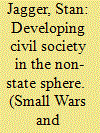

|
|
|
|
|
| Summary/Abstract |
Armed groups are usually seen as threats to humanitarian action but less attention has been paid where they provide assistance to constituent populations. Ethnic armed groups (EAGs) in Myanmar have developed associated welfare organisations that perform this role. This article argues this is due to EAG social embeddedness and flexibility to changes in sources of funding and support, and the influence of their relations with international humanitarian organisations. This article further contends a subset of advocacy, health and education organisations have evolved to form a nascent civil society within the political and social non-state sphere of some established EAGs.
|
|
|
|
|
|
|
|
|
|
|
|
|
|
|
|
| 15 |
ID:
186972
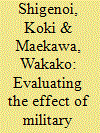

|
|
|
|
|
| Summary/Abstract |
This article examines the effect of foreign military intervention on rebel governance in terms of disaggregated human security. Case studies reveal that, on the one hand, a ‘thirst for legitimacy’ influenced by military intervention has led rebel groups to engage in internal and external diplomatic activities. Moreover, their efforts to develop fundamental rebel governance structures have had clearly positive effects on human security. On the other hand, when repelled from a territory by military interventions, rebel groups have attempted to control their remaining territories through the imposition of fear, which can devastate human security in rebel-held areas.
|
|
|
|
|
|
|
|
|
|
|
|
|
|
|
|
| 16 |
ID:
184182
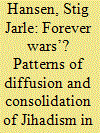

|
|
|
|
|
| Summary/Abstract |
The article will discuss the patterns that jihadism has followed when spreading throughout sub-Saharan Africa, addressing the major scholarly debates but also to bring forward the elements that various African cases seemingly have in common. The discussions over African Jihadism has seen several great debates, over the ungoverned space theory, a dichotomous discussion of the local and the global as opposing explanatory models, and a discussion of the role of ‘greed’ and economic incentives. The article argues that these discussions need to be transcended, and that dichotomous discussions fail to see more complex patterns of interaction between various factors, and the complexity of social relations that at times depend on the different contexts we study. Understanding how global networks can harness local conflicts to gain support is key to understanding African jihadist groups, and how those harnessing strategies can be limited. The article also suggests that there is an emerging consensus over several of the factors that do occur in sub-Saharan African jihadism and present the implications of these findings for the ongoing conflict in Mozambique and Tanzania.
|
|
|
|
|
|
|
|
|
|
|
|
|
|
|
|
| 17 |
ID:
153619
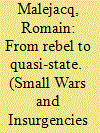

|
|
|
|
|
| Summary/Abstract |
How do warlords build their legitimacy and eventually exert authority? The case of Afghan leader Ahmad Shah Massoud demonstrates that warlords do not only build legitimacy through the internal provision of goods and services to the population under their control, but also build their legitimacy by projecting authority externally, through the development of their own form of diplomacy. In this article, I show that warlords develop complex and complementary legitimisation strategies that extend beyond their territorial realms to include consequential relationships with foreign actors.
|
|
|
|
|
|
|
|
|
|
|
|
|
|
|
|
| 18 |
ID:
189359


|
|
|
|
|
| Summary/Abstract |
The contributors to this special issue have put forth a research agenda that centers the politics of civil war, in contrast to what the introduction presents as the dominant rationalist paradigm. This paper anchors the special issue by first synthesizing the works contained therein. In particular, the articles in this issue focus on how individual and collective identity, networks and orders, and learning or socialization from previous experiences shape behaviors during and after conflict. Next, the conclusion to this special issue aims to move forward a perspective of civil wars that takes seriously the political in civil war by building upon the works contained in this collection and presenting a number of avenues for future research. In particular, this article advocates for taking seriously how individual experiences, identities, and relationships embedded within broader social processes shape and co-constitute civil war dynamics.
|
|
|
|
|
|
|
|
|
|
|
|
|
|
|
|
| 19 |
ID:
177010


|
|
|
|
|
| Summary/Abstract |
Research on conflict processes has recently highlighted the myriad of tactics rebels use which are not violent in nature (cf. Petrova 2019; Ryckman 2020; Cunningham, Dahl, and Frugé 2017). Concurrently, rebel governance has drawn increasing attention from scholars and peacebuilding practitioners. In-depth historical studies of rebel groups highlight the activities and behaviors that rebels engage in beyond making war—such as providing social services and building local political institutions (Mampilly 2011; Arjona 2016a; Arjona, Kasfir, and Mampilly 2015). Complementing these works, studies have sought to provide cross-national examination of trends in these governance behaviors (Huang 2016; Heger and Jung 2017; Stewart 2018). Despite this work, quantitative and formal research in conflict processes often ignores the insights that the rebel governance literature has generated, frequently focusing exclusively on violent tactics or considering governance issues primarily as part of conflict settlement processes. In this special feature, we work to integrate the study of rebel governance with the conflict processes literature, providing a conceptual link between the two while offering novel contributions to advance our understanding of the dynamic processes of rebel governance.
|
|
|
|
|
|
|
|
|
|
|
|
|
|
|
|
| 20 |
ID:
173388
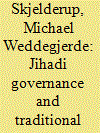

|
|
|
|
|
| Summary/Abstract |
Based on unique field work in southern Somalia, this article explores how the interrelationship between jihadi insurgent rulers and traditional authority structures fostered local order in the southernmost part of Somalia in the period 2008 to 2012. While the Jihadi insurgent group al-Shabaab’s state project was profoundly inspired by jihadi-Salafi ideology when it conquered large parts of South-Central Somalia in 2008–2009, it developed a strategy to cooperate with and co-opt local authority structures. This was partly a pragmatic approach in order to gain control of local institutions and populations. However, utilizing the local clan elders was a practical and cost-effective arrangement through which al-Shabaab could collect material resources, such as money, weapons, new recruits and other local resources. By sustaining the traditional authority structures, al-Shabaab also fostered a degree of trust and legitimacy from the local populations.
|
|
|
|
|
|
|
|
|
|
|
|
|
|
|
|
|
|
|
|
|